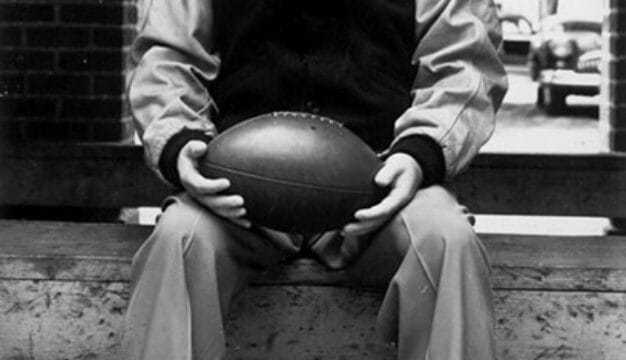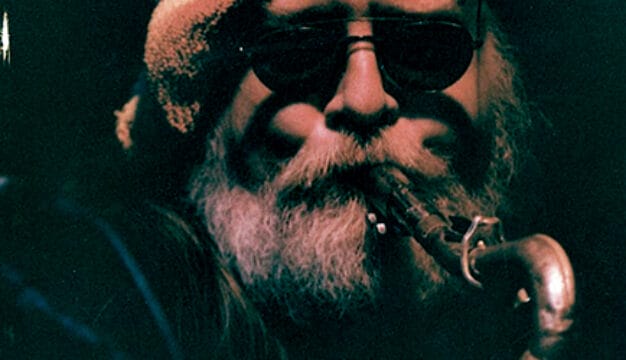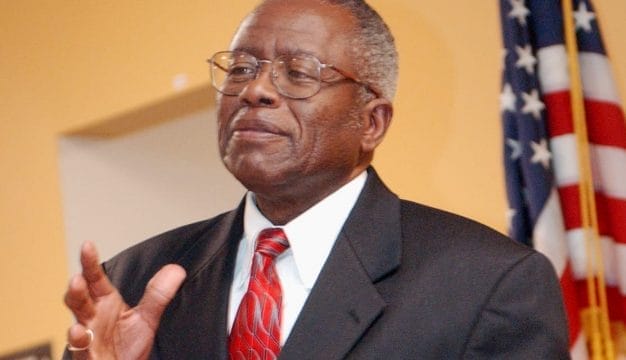Olin King
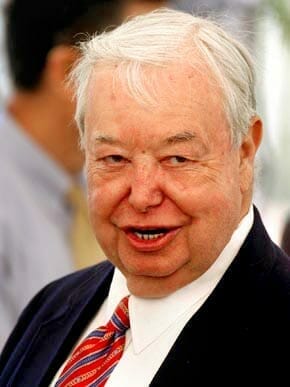 Olin King
Olin Berry King (1934-2012) was co-founder, former chairman of the board, and former chief executive officer of Huntsville‘s SCI Systems, Inc. (SCI), one of Alabama’s earliest aerospace businesses. By the time of his retirement in 2000, King’s pioneering development of contract manufacturing had made SCI the world’s largest contract manufacturer of electronics.
Olin King
Olin Berry King (1934-2012) was co-founder, former chairman of the board, and former chief executive officer of Huntsville‘s SCI Systems, Inc. (SCI), one of Alabama’s earliest aerospace businesses. By the time of his retirement in 2000, King’s pioneering development of contract manufacturing had made SCI the world’s largest contract manufacturer of electronics.
King was born in Sandersville, Georgia, on March 17, 1934, to George Olin King, a Methodist minister, and Elizabeth Berry King. He had one sister, Beverly King (Crawford). He married Ann Fordham in 1954, and the couple had three children. In 1968, after he and Ann King divorced, he married Shelbie Abbott, who had one son, Jay Hoyle, by a previous marriage. King earned a bachelor of science degree in physics at North Georgia College. After graduating he spent two years in South Korea as an Army Signal Corps officer. Later, he took courses in physics and electrical engineering at Emory University, Rutgers University, and the University of Pennsylvania.
In 1957, King moved to Huntsville and worked for the RCA Corporation, an international electronics firm, and then the Army Ballistic Missile Agency on its Jupiter intermediate-range ballistic missile program. After President Dwight D. Eisenhower shut down the Army’s satellite program in 1960, King decided to start a company designing and selling satellites to private buyers. In 1961, he and two partners pooled $21,000 and founded Space Craft Inc. (SCI). As they were completing their first design, for Johns Hopkins University, President John F. Kennedy announced the National Aeronautics and Space Administration (NASA) would focus on building weather and communications satellites in conjunction with the Saturn-Apollo lunar landing program, thus eliminating the motivation for private institutions to build satellites.
King took advantage of the new marketplace and capitalized on Apollo’s government contracts and the requirement for private contractors to provide quick, on-time delivery. Boeing and other lead contractors hired SCI to build subsystems for Apollo’s Saturn V “moon rockets,” as well as the Skylab space station, Titan III intercontinental ballistic missile, and Poseidon submarine-launched ballistic missile.
When the Apollo program ended in 1972, many Huntsville aerospace businesses shut down. King and SCI, however, were able to increase sales and profits, to accumulate additional capital by offering shares to investors, and to diversify into commercial activities. SCI also continued to win government aerospace and military aircraft contracts.
King hoped to take advantage of Huntsville’s highly-skilled engineers, inexpensive land, cheap power, and minimum-wage workforce. Responding to contractors’ need to keep costs down, King pioneered contract manufacturing by taking other companies’ designs, building them at low cost, then returning the finished products to the original company for distribution. King transformed a government-oriented engineering firm specializing in high-cost, low-volume satellites into a government and commercial manufacturing firm specializing in low-cost, high-volume products including personal computers.
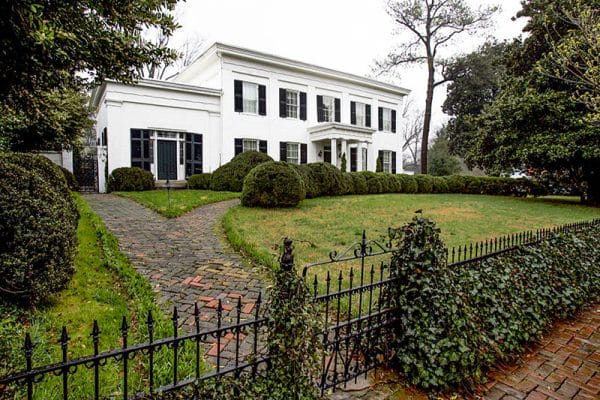 Fearn House
By 1965, King was both chief executive officer (CEO) and chairman of the board, positions he held until his retirement. By 1987, SCI Systems, as it had become known, was the world’s largest contract manufacturer, with plants in north Alabama, California, North Carolina, Scotland, and Singapore. It was also one of the country’s 500 largest companies on the basis of revenue.
Fearn House
By 1965, King was both chief executive officer (CEO) and chairman of the board, positions he held until his retirement. By 1987, SCI Systems, as it had become known, was the world’s largest contract manufacturer, with plants in north Alabama, California, North Carolina, Scotland, and Singapore. It was also one of the country’s 500 largest companies on the basis of revenue.
King dominated Huntsville’s social scene. He and Shelbie King bought the antebellum Greek Revival-style Fearn House in Huntsville’s Twickenham Historic District, filled it with French Empire furniture and hosted black-tie Christmas parties for “Olin’s 300,” an international group of millionaires. Characteristically in charge, King ordered the flowers, set the table with gold-rimmed glasses, and prepared the lobster tomato bisque. He became known as the “Godfather of Huntsville.”
Despite his high social and entrepreneurial status, King was not without detractors. In 1983, for instance, journalist Barry Siegel outlined in a Los Angeles Times article the limits of Huntsville’s prosperity. Siegel noted that high technology did not mean high wages, high skills, or a high number of jobs. SCI was the world’s largest supplier to International Business Machines (IBM), but its plant in Arab, Marshall County, which made IBM’s personal computers, provided only 400 low-skill, minimum-wage jobs mostly to women who had been seamstresses or chicken plant workers. Siegel concluded high-technology wealth was tied to the dwindling of a well-paid, blue-collar middle class and a growing gap between rich and poor.
King was outraged at the portrayal and responded with a full-page “Open Letter” in the Huntsville Times. He called Siegel a “New York liberal” who had not developed the “correct perspective.” King admitted, however, he wanted Arab for the IBM plant because of its non-union labor. He also resisted all efforts to unionize SCI, prohibited hiring former union workers, and opposed state efforts to protect workers. King, whose company was the largest private employer in the Tennessee Valley and one of the largest in Alabama, unsuccessfully allied with other Alabama manufacturers to oppose the state’s 1984 law that allowed injured workers to sue co-employees for damages.
On June 30, 1999, King stepped down as CEO. Exactly one year later, he officially resigned as chairman of the board. He was 66 years old. When he retired, the company he co-founded was the world’s largest contract manufacturer of electronics. SCI had more than 31,500 employees in 17 countries in Europe, Latin America, Asia, Canada, and the United States with sales in excess of $8 billion for the fiscal year that ended on June 30, 2000. By that time, King was one of the 100 richest people in high-technology industries, with a personal worth estimated at $105.2 million. In 2008, King suffered a heart attack while attending the SEC Champtionship football game between the University of Florida and the University of Alabama in Atlanta, Georgia. He never fully recovered and died on June 16, 2012.
King was honored with many awards, honors, and distinctions throughout his life. He was a director or trustee of numerous institutions including the University of Alabama System and the University of Alabama in Huntsville Foundation. He was a trustee of the Alabama Heritage Trust Fund money raised through the sale of Mobile Bay oil and gas drilling leases. The National Management Association named King its Executive of the Year in 1984. In 1988, he was inducted into the Alabama Academy of Honor. The Chamber of Commerce of Huntsville/Madison County awarded him its Distinguished Service Award in 1993, and the University of Alabama inducted him into its Business Hall of Fame in 2000. King received honorary degrees in science and engineering from the University of Alabama and the South Dakota School of Mines and Technology.
Critics have charged that King contributed to the widening gap between rich and poor by pushing for low-wage labor in the United States and overseas; admirers counter that he improved Alabama’s image. Clearly, he led Huntsville’s development as a center of U.S. high-technology industries. He also pioneered contract manufacturing and fueled the boom in technology stocks that created multimillionaires in Huntsville and elsewhere.
Additional Resources
Gerdes, Bill. “Business Hall of Fame to Induct 6 New Members in Ceremony at U. A.” University of Alabama News, October 6, 2000; http://uanews.ua.edu/oct00/hof100600.htm
Kellner, Tomas. “Critical Mass.” Forbes, May 26, 2003; http://www.forbes.com/forbes/2003/0526/130.html

